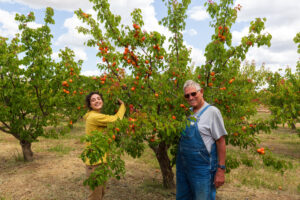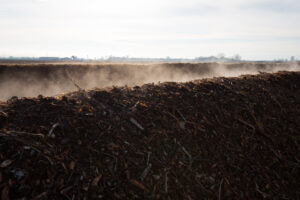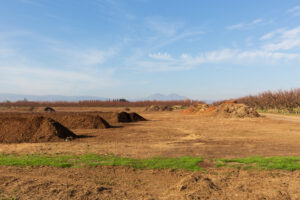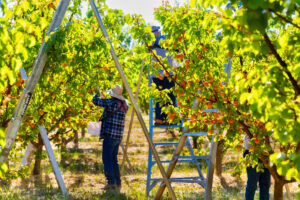Turning Green’s summer interns have had the exceptional pleasure of learning about sustainability and environmental justice from a new guest speaker every week, and now we’ve been given a virtual farm tour! This tour was led by our most recent guest speaker, the legendary Farmer Al Courchesne of Frog Hollow Farm in Brentwood, California. With the support of Farm Manager Rachel Sullivan, who runs just about everything from sales and marketing to soil health sampling and crop-pl anning, our summer interns and team were lucky enough to receive a virtual tour of the farm in peak season. Upon joining us on Zoom, Rachel panned to Farmer Al smiling warmly in his golf cart surrounded by his famous trees. He showed us beautiful groves that bear some of the country’s finest stone fruits and more, which Al has been growing for 48 years, and helped us to understand what has made Frog Hollow Farm an icon in California’s organic farming scene.
anning, our summer interns and team were lucky enough to receive a virtual tour of the farm in peak season. Upon joining us on Zoom, Rachel panned to Farmer Al smiling warmly in his golf cart surrounded by his famous trees. He showed us beautiful groves that bear some of the country’s finest stone fruits and more, which Al has been growing for 48 years, and helped us to understand what has made Frog Hollow Farm an icon in California’s organic farming scene.
As they drove through seemingly endless rows of trees, everything from apricots to mulberries, it was obvious that Farmer Al was full of exuberance and passion. He showed us his pluots, the sweetest fruits they grow at Frog Hollow Farm, and signature Suncrest peaches, glowing with a golden orange hue. Each fruit is treated with respect and reverence, as Farmer Al made clear how much he enjoys not only eating them, but growing and sharing them with others.
The immense amount of work put into the farm was clear, as every single piece of fruit represents a real labor of love. Take the cherry trees for example, Farmer Al says they are replanted what “seems like every year,” whether it be due to gophers gnawing away or falling ill from root disease. A lot of intention goes into maintaining root systems, like their irrigation system that only targets the roots, as to not waste excess water. And those are just the cherry trees! The real kicker of just how much work is done on the farm, however, was when Al showed us his old peach orchard, where he removed acres of 25-year-old trees to begin anew. The entire process takes years before new trees grow and can cost $15,000 to $20,000 per acre, highlighting the risks and care involved with quality, organic farming. All of this replanting and irrigation and care really matter at the end of the day, as they come together to produce some of the world’s best peaches.
Another vitally important part of Al’s operation is the large community of farm workers at Frog Hollow Farm. As he drove around, he made note of all the people happily bouncing along by the trees, or as Al put it, “singing and laughing and dancing.” He clearly loves what he does, and wants to make sure that his workers love it too. For the amount of work required on the farm, Al needs year-round help, so the workers all live on Frog Hollow Farm itself. Generations of people have worked on the farm, and several marriages have even blossomed among people who met working there; it really feels like one big community.
A highlight of the tour was the chance to see and learn about their elaborate composting operation. Al and Rachel pointed out four large piles of ingredients: woody materials from chopped down trees, horse manure from the large boarding stables next door, organic coffee grounds from Blue Bottle, and all of the fruit scraps that were too ripe or damaged to be sold. While Frog Hollow Farm’s onsite kitchen turns the fruit that can’t be sold into delicious jams, marmalades, dried fruits, and excellent pastries made by Al’s wife, Becky Courchesne –, not all fruit is usable, so composting is an excellent way to minimize wastage. This nutrient-dense mixture of materials provides the right amount of carbon from the woody materials and fruit scraps, nitrogen from the horse manure and coffee grounds, and other nutrients to build healthy soils. Such rich compost is a huge part of why Frog Hollow Farm’s soil grows healthy fruit that flourishes.
Organic, regenerative farming is not easy and requires constant adjustments, such as providing more calcium to soil or flexibility with the changing climate affecting harvests. This healthy soil is the backbone of the whole operation, and where a tremendous amount of the work and care of the farm go. Frog Hollow Farm never tills their soil, nor uses synthetic pesticides or fertilizers, so soil stays undisturbed and healthier than ever. Less tampering with soil allows it to be far more porous, allowing space for roots to grow big and healthy. Most importantly, it allows the soil to be far more absorbent. This avoids the issue that many conventional farms face after California’s unprecedented storms this year: standing water. These pools of non-flowing water can be a major environmental hazard, as they can be breeding grounds for diseases and bacteria, which could then contaminate the soil and local environment. Pools of standing water on a farm indicate that water is not being absorbed by the soil and thus not by the plants. Thanks to regenerative farming practices, Frog Hollow Farm’s soil was able to brace the impact of these intense storms, absorbing all the water that rained down on it. Soil is an integral part of a farm’s ecosystem, and Frog Hollow Farm is heavily aware of that. In the face of climate change, where unprecedented storms are becoming more and more common, organic and regenerative practices are essential.
Our tour of Frog Hollow Farm was enlightening, exciting, and engaging. As amazing as it was to see the sheer variety of produce grown at the farm, especially the famous peaches, the details and intricacy of how Farmer Al and his team apply regenerative farming principles was truly the highlight. From showcasing the elaborate composting operation to a deep-dive into the importance of soil health and resilience, it was clear that Frog Hollow Farm is pushing the envelope with the power of organic farming. To do all that while fostering a community of employees on the farm who love what they do and have done it for generations is incredibly special. Thank you so much to Rachel and Farmer Al for your fantastic work on the farm, and for sharing that work with us at Conscious Kitchen!